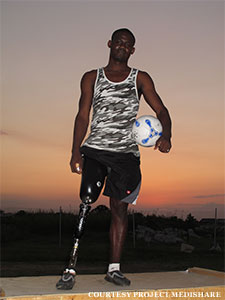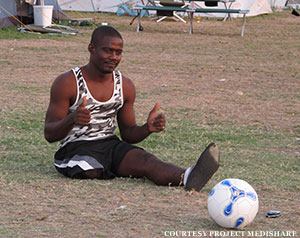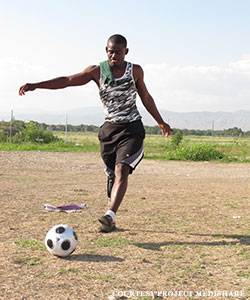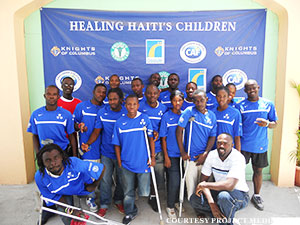
A wall crushed Wilfred Macena's right leg the day the massive earthquake hit Haiti. He was working as a welder, a respected position on the island.
It was January 12, 2010, and Macena was on the job in a remote area outside Port-au-Prince. The building he was working on began to crumble. Holding a palm tree up with one side of his body and the wall with his other, Macena tried to escape before the structure completely collapsed, but as he took one step toward safety, the wall came tumbling down on his right leg. With bone tearing through his skin, Macena crawled to the nearest road -- or what was left of it. Several hours later -- he doesn't remember how many -- someone drove by with a truck and picked him up. He knew he needed a hospital, but the only things running through his mind were his wife and child.
There was too much chaos in the ravaged city between the truck and any hope for medical care. Wilfred said the driver had no choice but to leave him. He remembers lying in the bed of the truck for an entire day, sure he was going to die. But the driver came through. A relative found him the day after and took him to see his family. For seven days after the earthquake, he waited at home without seeing a doctor. By the time a cousin could drive him to a hospital in the Dominican Republic, it had been an entire week. Doctors there had no choice but to amputate his right leg, which had become severely infected.
Macena, a young, hard working husband with a giant smile, became an amputee -- a cultural stigma few Haitians are every truly able to rise above. But thanks to the tireless work of a few new friends and the seemingly casual kick of a soccer ball, Macena hasn’t just overcome his injury. He’s turned it into a new career, and is working every day to turn the country’s view of amputees upside down.
While Macena was suffering through the first week after the earthquake, Dr. Bob Gailey and his colleagues Jason Miller and Adam Finnieston were making their way to Port-au-Prince to help amputees at a tent hospital set up by Project Medishare at the city's airport.
"I was watching the news when it happened, and I immediately though to call Dr. Gailey," says Finnieston. Dr. Gailey, a physical therapist at the University of Miami, is known for his work with amputees in the military and athletics. "I called him up and asked if there was anything I could do."
"Get your toothbrush," Gailey says. "We're sending you down tomorrow."
"It was the wild wild west down there," Finnieston recalls. "There were so many amputations from crush injuries."
At the Project Medishare trauma hospital -- a loose term considering they were operating out of a tent on the airport runway - Finnieston saw there was no rehab in place for the amputees. They were undergoing amputations and being sent on their way. Amputees need weeks to heal before they can be fitted for prostheses, but the team was committed to building a rehab clinic.
A few months later, on April 2, a cheerful young man named Wilfred Macena walked into the hospital and changed their mission forever. He was the first above-knee amputee they'd seen. Fitting him for a prosthesis presented a whole new challenge, not to mention the physical rehabilitation.

Gailey, who is now director of rehabilitation at Project Medishare, couldn't turn him away, even though he wasn't sure he could help. There was something about his warm personality and huge smile that inspired the whole team.
"Within five minutes of meeting him, I knew I had do something for him," Finnieston says.
Using a special software called Bio Sculptor, he scanned images of the new patient and sent them immediately to his Miami clinic. A leg was sent down within a day, built from extra parts the lab already had.
"We fit him in one try," says Finnieston. "This sometimes takes weeks in the U.S."
"When the people at Medishare told me I'd be able to walk again, I said 'No, I don’t believe that,'" Macena says. "I had never seen anyone with an above the knee [amputation] walking."
It was April 5. With the new leg fitting flawlessly, Finnieston turned around to grab the nearest crutches. When he looked back for his patient, he did a double take. There was Wilfred, walking out the door without crutches. When he came back the next day for therapy, he was already reaching what it can take weeks or even months for the typical above the knee amputee to accomplish. While Finnieston was taking a break, Macena walked into the field adjacent to the tent hospital where some nurses and staff were kicking around a soccer ball. He joined them, kicking the ball with his new right leg as if he'd been born with it.
"After kicking the soccer ball, we’re spending the next 45 minutes teaching him how run and to balance on the prosthesis," Gailey says. "I would do this with the average person probably six months after an amputation."
Miller, a physical therapist and now director at Project Medishare, said it was rare to see one of the Haitians embrace their new condition so comfortably.
"Disabled people live on the edge of society in Haiti," Miller explains. "A lot of people hid their injuries ... there's a belief that you must have done something bad and deserve what happened to you."
But Macena didn't care. He wore shorts, putting his prosthetic leg onstage for everyone and anyone to see. That was the day his doctors and therapists decided he’d make a great prosthetic tech -- and the day Team Zaryen was born.

"The fact that he was so nonchalant about it was why we decided to train him to be a prosthetic tech," Miller says. "But we also knew Wilfred loved playing soccer. Haiti is a soccer country, and there was this whole slew of young, athletic guys we had treated that wanted to play soccer. It was really natural."
The Knights of Columbus and The Challenged Athletes Foundation joined Project Medishare to help foot the bill. Cedieu Fortilis, who was helping as a translator and learning how to be a prosthetic tech, volunteered to organize the team. They found a field near he hospital, though Gailey said it has more glass and rocks than blades of grass. Still, the team began practicing three days a week, sliding on the turf as if it were any field in suburban America.
The players chose a merciless figure for their team name. Zaryen is a Creole word for tarantula, a spider that can kill with one bite and still function with a leg missing. The team logo only has seven legs.
"I have a new life," Macena says. "I can walk, play soccer ... and the other players are so happy when they see they can play soccer. They come to training and I see their faces, and they smile every time. They seem very comfortable."
The players are certainly smiling, especially when they’re owning the field.
"We actually played them," says Miller of the "two-legged folks" working at the clinic. "We lost 2-1 on a last second goal. These guys go full speed; they are aggressive and extremely fast."
About half of Team Zaryen's players were injured during the earthquake, but there’s another culprit in Haiti behind the country's large number of amputees. The number one cause of amputations in the country is car accidents, many related to the "tap tap," Haiti’s shared taxi service.
With so many amputees shunned from the community and pushed to the bottom of the list for jobs and schools, Team Zaryen is an opportunity for the players to shine in front of their families and friends.
"If you're handicapped down there, you're treated as a lesser member of society," says Finnieston. "Everyone has to contribute or you don't eat, and if you’re handicapped, that means someone in your family has to take care of you, which takes away the economics of the family unit."
But Finnieston believes Team Zaryen might be slowly swaying public opinion.
"With the soccer team they can show everybody else in Haiti they are not handicapped, they can contribute with proper prosthetic care and be more than what society says they can be," he says. "Neighborhood kids will make fun of the players, but then they get on the field and see how fast these guys can run -- they’re not second class citizens."
Gailey, Miller and Finnieston were all quick to share the same story. The Challenged Athletes Foundation sponsored a visit from U.S. Paralympics star runner Blake Leeper, a bilateral below-the-knee amputee. Leeper showed up in Port-au-Prince to visit Team Zaryen for a running clinic.
"The minute he gets off the bus at the soccer field, the neighborhood kids are making fun of him,” Gailey says. "But then he put on his running feet and said 'I'll race any one of you.'"

The fastest kid took the challenge, and Leeper schooled him. Then the next fasted kid. And then the next, until Leeper's proven speed kept any other prospective runners quiet.
"They were mesmerized," Gailey says. "We had hundreds of kids watching the clinics."
Plenty of the kids watch practices regularly, as if Team Zaryen was the local Major League Soccer club. The acceptance of Haiti's amputees is a significant part of Team Zaryen’s mission, “one day and one leg at a time.” The players are all actively involved with Project Medishare's programs to help young amputees return to school and adults return to work.
"This is God's will," Macena says of his new job as a prosthetic technician. "There's a larger plan for me. I can fit children with legs and be a good example."
American soccer players better watch out. Team Zaryen is coming to the U.S. for a tour Oct. 12-23. They'll visit Washington, D.C., and the Walter Reed National Military Medical Center to meet with American veterans, and then travel to New York and Connecticut. The goal is to inspire American veterans to start their own amputee soccer team and compete globally.
While Macena and Fortilis are excited to meet American vets and play for a new audience, they admit to another ambition for trip.
"If we play the Americans, I hope we beat them," Macena says.
Gailey and his colleagues have big plans for Team Zaryen, and if they can secure the funding, they hope to compete in a world game.
"The hope is that this will perpetuate forever, and build a tradition of amputee soccer in Haiti," Gailey said. "If the current Prime Minister leaves, or the funding stops, they aren’t going to give up.
"They will find a way to get together, find a ball and play."




